5 Drinks The Longest Living People Enjoy Every Day
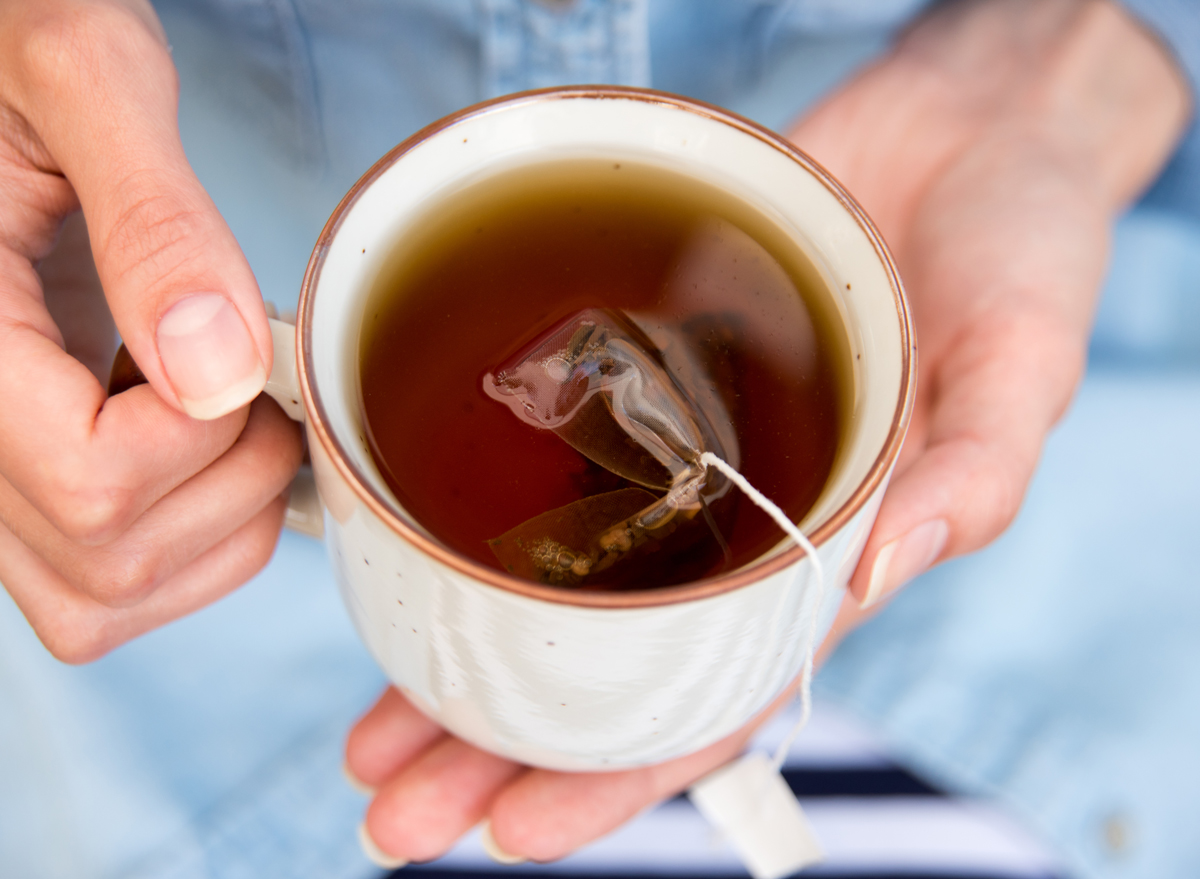
These days, life expectancy in the U.S. has hovered around 77 years—but in the so-called "Blue Zones," it's considerably longer. In fact, it's not uncommon for citizens in these regions—which include Sardinia, Icaria, Okinawa, Nicoya, and Loma Linda—to live past 100. So, if you're looking to lengthen your lifespan, it goes without saying that you'll want to take a cue or two from their eating and drinking habits.
You'll be hard-pressed to find processed drinks like soda, sugar-sweetened juice, and sports drinks in a Blue Zone resident's fridge. But what you will find is some of the following tasty drinks—many of which are chock full of disease-fighting antioxidants and other key health-promoting nutrients. Looking for more Blue Zone diet tips? Check out the 9 Foods The Longest-Living People In The World Eat Every Day.
Water
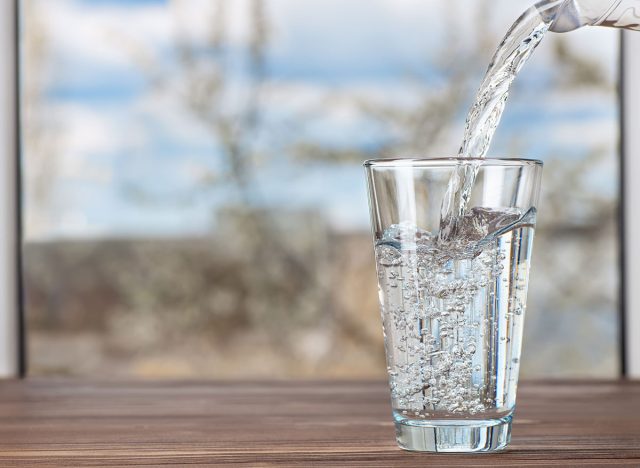
Across all of the Blue Zones, it's common to serve water at meals—plus drink it in between throughout the day.
"Water is essential for living longer because it helps the body eliminate toxins, maintain normal blood pressure, transport nutrients, balance electrolytes, and boost metabolism," says Nataly Komova, MS, RD at JustCBD. "Drinking enough water daily can improve how the body functions, increasing your lifespan in the long run."
According to the Mayo Clinic, about 50% to 70% of your body is made up of water. Not only that, but the Centers for Disease Control and Prevention (CDC) reports that it helps protect your spinal cord, lubricate and cushion your joints, and ensures your body maintains a normal temperature.
Of course, not all drinking water is created equal. For instance, in Nicoya, a peninsula on the coast of Costa Rica, the water tends to be very high in bone-strengthening calcium and magnesium. Research has shown that mineral water not only promotes bone health but also benefits digestion.
Black coffee
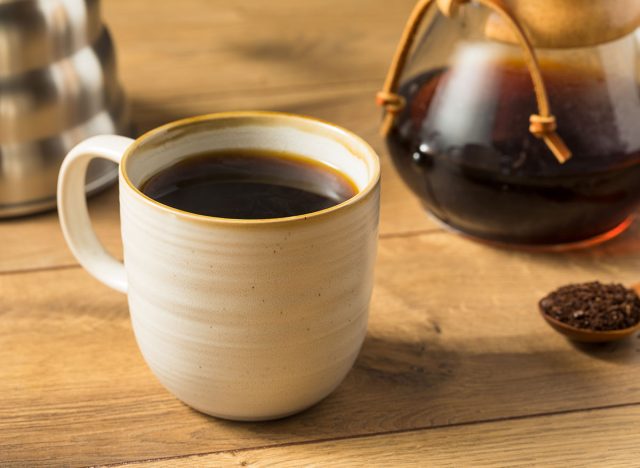
"Coffee beans are full of antioxidants, polyphenols, and other anti-inflammatory agents, and may be associated with longevity and lower chronic disease risk," says Dana Ellis Hunnes, a senior RD at UCLA Medical Center and author of the new book Recipe For Survival.
Sardinians, Ikarians, and Nicoyans are all known for being daily java drinkers. A 2018 study in Progress in Cardiovascular Diseases found that habitual coffee consumption is linked to reduced risks for cardiovascular death, coronary heart disease, congestive heart failure, and stroke—as well as improvements in some cardiovascular risk factors, including type 2 diabetes and obesity. Not only that, but the research revealed chronic coffee consumption may protect against some neurodegenerative diseases and is associated with lower risks for liver disease and cancer.
That said, it's important to note that adding heaps of sugar, cream, or flavored syrups to your drink can cancel out the health benefits of coffee—so do as the Blue Zoners do and drink it black. Or, if that tastes too bitter or acidic for you, just add a splash of almond or oat milk.
Red wine
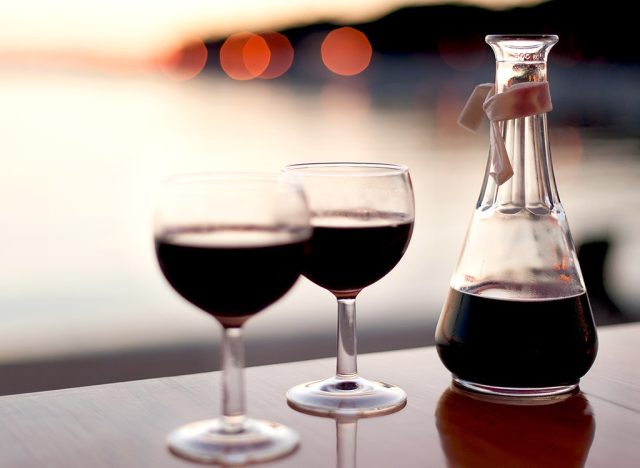
Some good news if you're a firm believer that wine elevates any good meal: Blue Zone residents— especially those in Sardinia and Icaria—don't tend to deprive themselves of a glass or two of high-quality, dry red. Specifically, Sardinians are known for enjoying a regional red called Cannonau, which boasts two to three times the flavonoids—antioxidants that help your body fend off everyday toxins and other potentially harmful molecules.
According to Komova, red wine contains high amounts of resveratrol, an antioxidant that may help lower levels of "bad" LDL cholesterol, lower inflammation, and prevent damage to blood vessels.
Better yet, a 2018 study in the journal Diseases found a link between moderate alcohol consumption and lower risk of mortality, with the lowest mortality at one or two drinks per day.
Remember, though, that less is more when it comes to wine drinking. If you exceed the recommended one glass per day as a woman or two as a man, the health risks may start to outweigh the benefits.
"Though moderate drinking may have some health benefits, alcohol may also worsen certain health conditions," says Jeanette Kimszal, RD. "Also, the quality of alcohol in the Blue Zones may be better than in the U.S.—where wine may contain preservatives and additives that can affect the gut microbiome."
Green tea
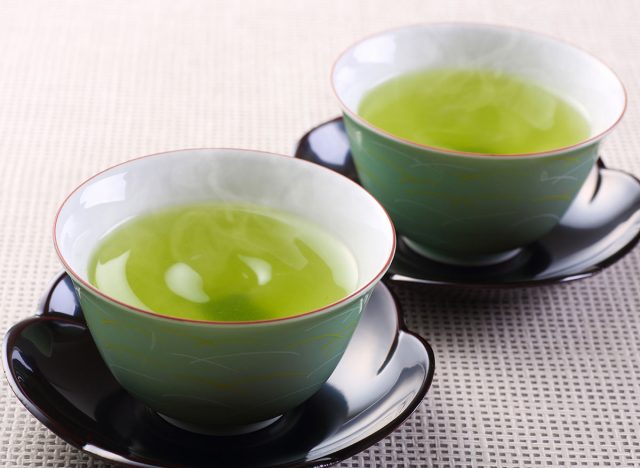
According to Hunnes, tea is a daily diet staple in many of the Blue Zones—particularly Okinawa, where residents can be found nursing a large serving of green tea all day long.
"Green tea is high in catechins and polyphenols exhibiting antioxidant properties, which prevent diseases by fighting free radicals, regulating cholesterol, stabilizing blood pressure, and enhancing cell division," says Komova. "All these benefits prolong your lifespan."
One 2007 study in Nutrition Reviews found that green tea consumption was associated with better overall cardiovascular health, while another 2017 review in Phytomedicine found a potential link between green tea consumption with improved memory.
As an added bonus, a 2013 study in The American Journal of Clinical Nutrition found that drinking green tea may be able to significantly reduce fasting blood sugar levels, thus helping to prevent the development of type 2 diabetes. Meanwhile, epigallocatechin gallate, a specific type of antioxidant in green tea, may help to inhibit cancer tumor growth, according to a 2011 study in Cancer Metastasis Review.
Trying to limit your caffeine consumption? You can still reap many health benefits of tea—just take a cue from the Icarians and enjoy an herbal blend of anti-inflammatory rosemary, dandelion, and wild sage. Or, try the Sardinian go-to: milk thistle tea, which is believed to cleanse the liver.
Black tea
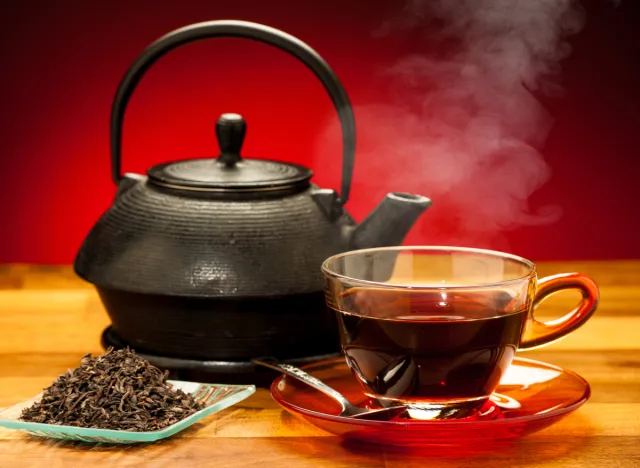
Green tea may most of the attention for its antioxidant content, but don't underestimate the power of black tea, which research has proven can offer many of the same disease-fighting benefits.
Studies have shown that black tea can boost longevity in many different ways, including reducing blood sugar levels, reducing your risk of heart disease, improving cholesterol, helping you maintain a healthy gut by promoting good bacteria and inhibiting the growth of bad bacteria, decreasing blood pressure, preventing the spread of breast cancer tumors, and lowering your risk of stroke.
In order to reap all of these perks without any potential pitfalls, drink your black tea the way a Blue Zone native would: without any added sweeteners. If you want to boost the flavor, try adding a squeeze of lemon or some fresh mint.









